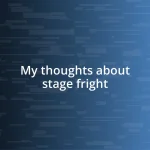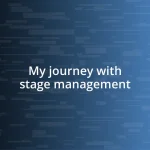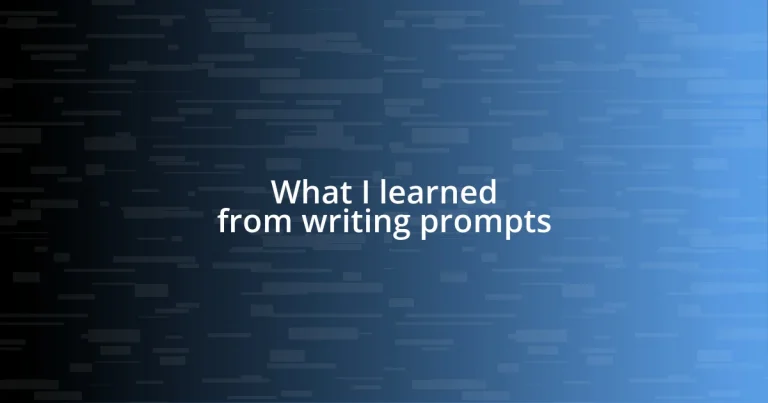Key takeaways:
- Writing prompts serve as tools for creativity, encouraging writers to explore unfamiliar themes and deepen their understanding of narrative.
- They enhance discipline in writing by providing structure and routine, leading to personal growth and connection with one’s creative self.
- Different types of prompts—such as character-driven, visual, and unexpected scenarios—can unlock new storytelling opportunities and emotional depth.
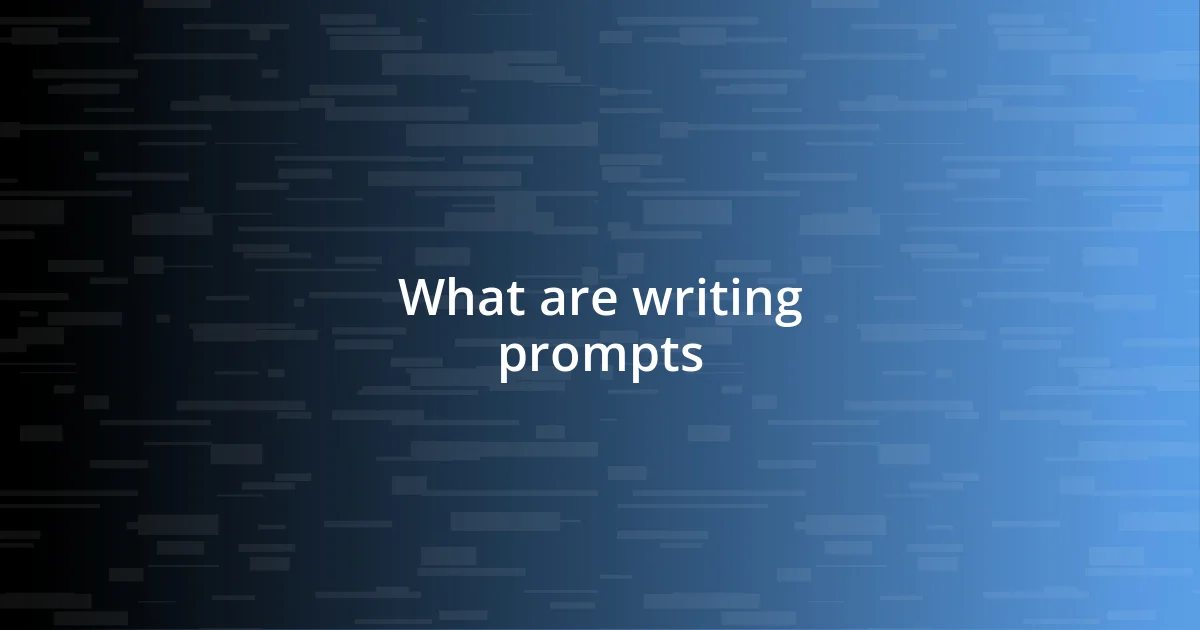
What are writing prompts
Writing prompts are essentially seeds of inspiration, serving as a catalyst for creativity. They can take many forms, ranging from a single word to a full scenario, and they challenge you to explore new ideas and perspectives. I remember sitting down one afternoon, feeling uninspired, and stumbling upon a prompt that asked me to describe a moment of fear. It was like flipping a switch; suddenly, I was flooded with memories and emotions, and an entire story unfolded.
Sometimes, I wonder how much we limit ourselves by sticking to familiar themes. Writing prompts push those boundaries, prompting us to dive into uncharted territory. For example, a prompt about a misunderstood character allowed me to empathize and explore motivations I hadn’t considered before. It was eye-opening and made me realize how rich and layered storytelling can be when we allow ourselves to step outside our comfort zones.
At their core, writing prompts offer a space for exploration, experimentation, and growth. They invite us to tap into our imaginations and confront our creative blocks head-on. I’ve found that responding to prompts not only ignites my creativity but also deepens my understanding of my own writing style and voice. What prompts could you explore that might lead you to unexpected discoveries about your own creative journey?

Benefits of using writing prompts
Using writing prompts can significantly enhance creativity. They act as powerful tools that encourage you to think outside the box. I recall an instance when I encountered a prompt asking me to write from the perspective of an inanimate object. At first, it seemed silly, but I went along with it and discovered a fresh voice within me that I hadn’t tapped into before. That experience really broadened my understanding of narrative possibilities.
Another benefit of writing prompts is their capacity to develop discipline in writing. I often find it challenging to sit down and write regularly, but setting a specific prompt can transform that struggle into a rewarding exercise. For example, when I committed to responding to a prompt every day for a month, I noticed not only my writing improved, but I also felt more connected to my creative self. It’s like giving my imagination a workout—it strengthens my writing muscles.
Lastly, prompts foster a sense of community among writers. Sharing responses to the same prompt with friends or writing groups can spark engaging discussions and provide different interpretations that I might not have considered. Perhaps you’ve experienced this too—hearing someone else’s take on a similar prompt can inspire me in unexpected directions. It’s a comforting reminder that writing is a journey best explored together.
| Benefit | Description |
|---|---|
| Enhances Creativity | Encourages out-of-the-box thinking, revealing new narratives. |
| Develops Discipline | Prompts create routine, making writing a habit. |
| Fosters Community | Sharing experiences enriches perspectives and inspires. |
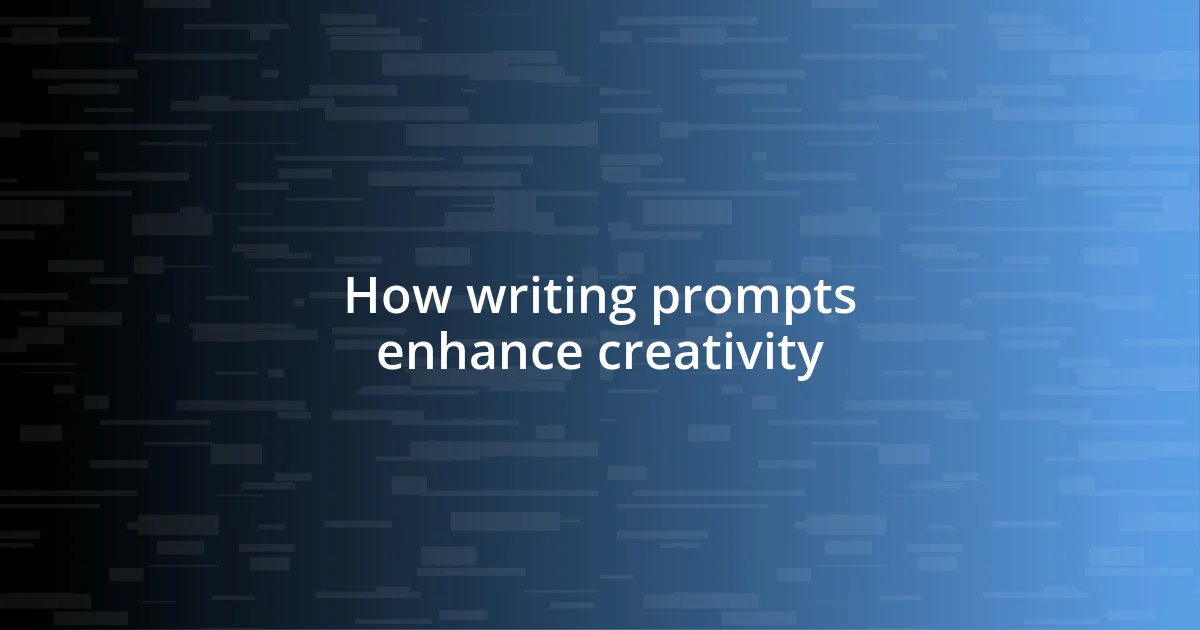
How writing prompts enhance creativity
Writing prompts can truly unlock a floodgate of ideas that might otherwise remain hidden. Just last week, I stumbled upon a prompt that asked me to write about a day when everything went wrong. Initially, I hesitated, but once I started, it felt like I was digging into a treasure chest of memories. I found myself rediscovering past emotions, transforming my misfortunes into relatable characters. This exercise not only sparked creativity but also helped me reflect on resilience, which I think is a powerful theme in storytelling.
- They encourage exploration by pushing you to tackle unfamiliar subjects.
- They ignite emotions that fuel deeper storytelling, revealing more about the human experience.
- They allow for experimentation with different voices and styles, expanding one’s creative toolkit.
Whenever I take on a prompt, I see it as a playground for my imagination. I remember a particularly memorable one that asked me to write about a moment of silence. It felt deceptively simple, yet it led me to explore the tension in everyday life, allowing me to paint vivid pictures with words. Returning to such prompts reminds me that creativity often lies just beyond the edges of comfort, waiting to be discovered if we’re willing to engage with it.
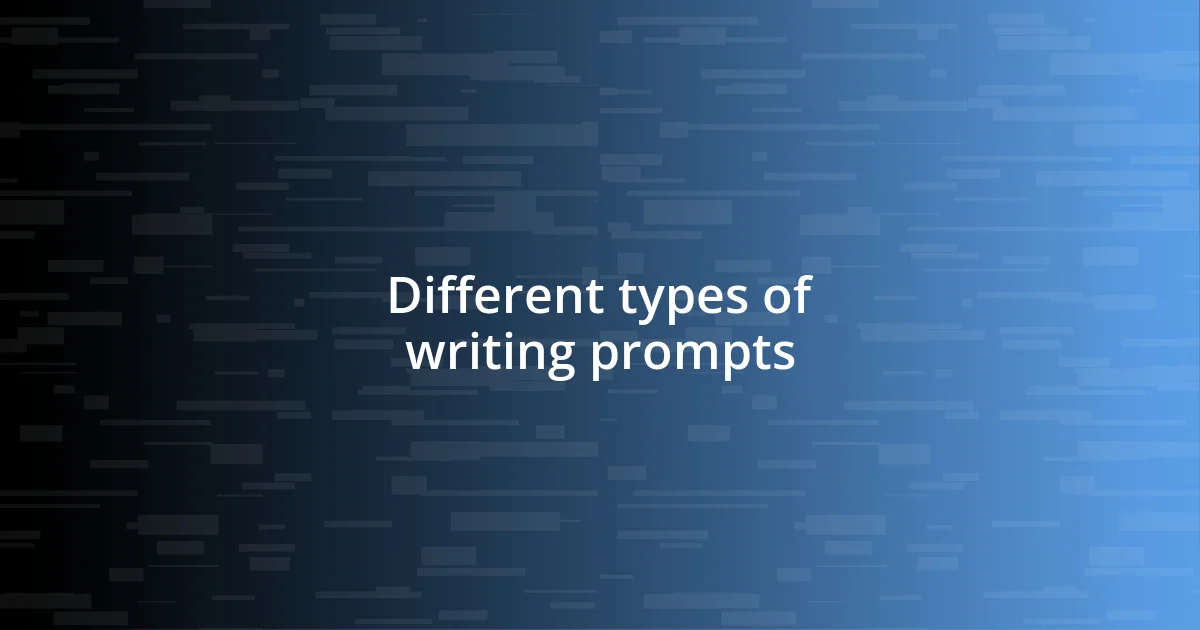
Different types of writing prompts
Writing prompts come in a variety of forms, each offering unique opportunities for creativity. For instance, there’s the classic genre-based prompt that asks you to explore a specific style, like writing a horror story or crafting a romantic scene. I remember when I tried my hand at a horror prompt; it was a thrilling challenge to build suspense. I found myself digging deep into my fears, which ultimately made the story more compelling.
Another type of prompt that I often encounter is character-driven. These prompts focus on the people within the story rather than the plot itself. I once received a prompt about a character who had just lost their job. As I began to write, I realized it opened up a wealth of emotional experience and allowed me to connect with different facets of human struggle. Does it surprise you how much depth can come from a single character’s journey?
Then there are visual prompts, which, for me, can be incredibly inspiring. A simple image can ignite a cascade of ideas. I remember seeing a photograph of an old, empty diner; it sparked a vivid story about lost dreams and the passage of time. Visual prompts push me to describe settings and evoke emotions in a way that words alone often can’t convey. Have you ever looked at a picture and felt an entire story unfolding in your mind? That’s the magic of visual prompts—they draw us in and compel us to create.
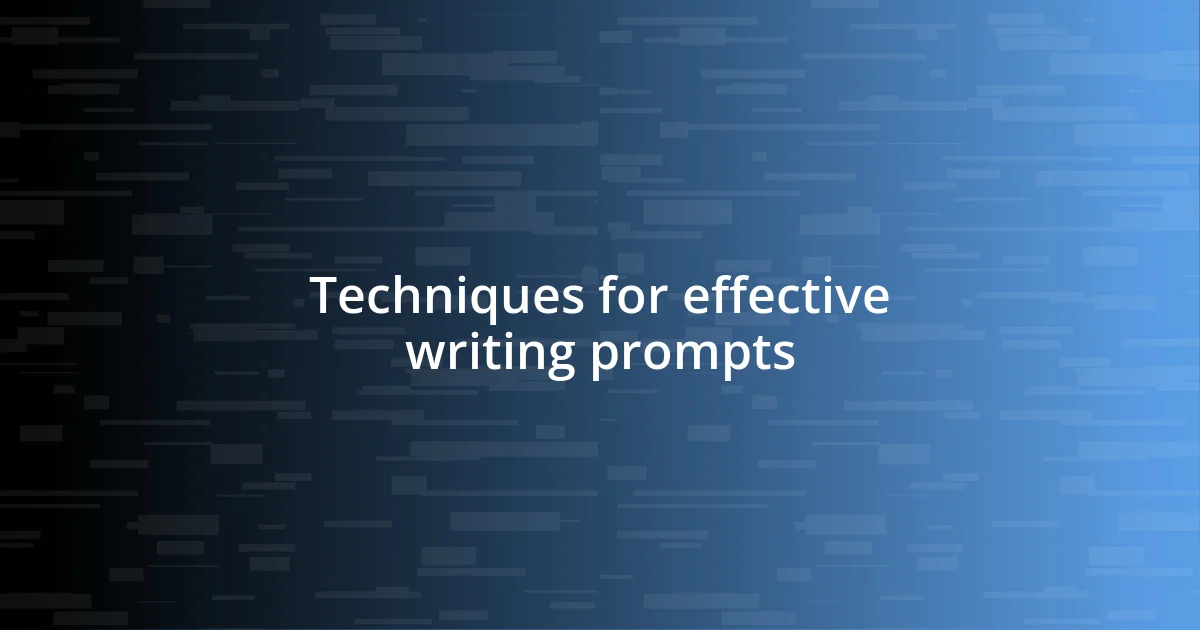
Techniques for effective writing prompts
One technique that has helped me craft effective writing prompts is to infuse them with personal stakes. I created a prompt centered around a cherished memory, wanting to explore the emotions tied to that moment. As I delved into the details, I realized just how much personal history can fuel a narrative, making it resonate more deeply with both the writer and the reader. Have you ever tried writing about something you’ve experienced firsthand? It can unlock a level of authenticity that makes the words come alive.
Another powerful strategy is to incorporate unexpected twists into prompts. For instance, I once encountered a prompt that started with a seemingly mundane scenario: “A person finds a forgotten letter.” It was to my surprise that this simple setup led me to a storyline involving long-lost love, secrets, and the impact of choices made years ago. The unpredictability kept my creative juices flowing and challenged me to think outside the box. Isn’t it fascinating how a prompt can shift the entire direction of your story?
Lastly, I’ve found that setting a clear objective can enhance the effectiveness of writing prompts. Once, I challenged myself with a prompt that asked me to convey a specific emotion, like longing, in under 200 words. This constraint forced me to choose my words carefully and get to the heart of what I wanted to express. By narrowing the focus, I uncovered a clarity that often gets lost in longer pieces. Have you experimented with word limits before? The discipline it brings can be surprisingly liberating, opening doors to new creative avenues.
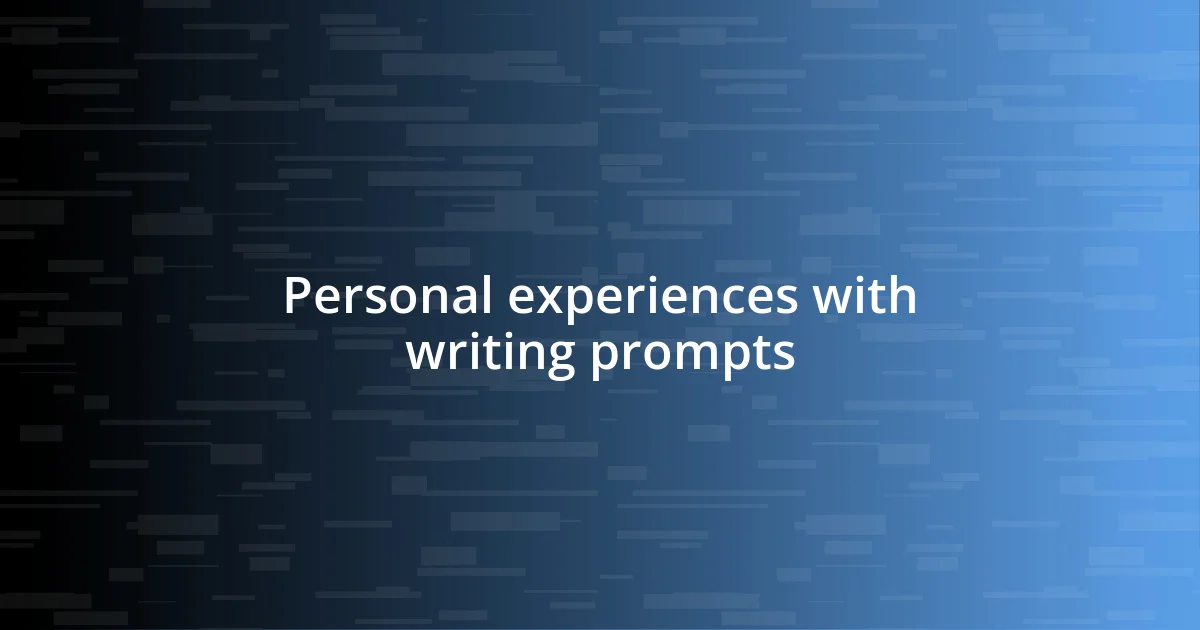
Personal experiences with writing prompts
Writing prompts have been a game changer in my creative process, especially those that revolve around vivid scenes. I recall once working with a prompt that asked me to describe a bustling market. As I immersed myself in the details—the vibrant colors, the cacophony of voices—I found joy in crafting a tapestry of life. It’s moments like these that awaken my senses and pull me out of my comfort zone, allowing me to explore new narratives. Have you felt that spark when you paint a scene with words?
The emotional connection I have with prompts often surprises me. I once picked a prompt about a character facing a sudden, life-altering event. At first, I approached it with some detachment; however, as I wrote, I found my own fears and anxieties creeping into the narrative. It turned into a cathartic experience that reflected my own vulnerabilities. Isn’t it amazing how writing can hold a mirror to our lives, urging us to confront feelings we may have otherwise buried?
Moreover, I’ve noticed how writing prompts can serve as a springboard for unexpected storytelling avenues. Recently, I tackled a “what if” prompt that set my imagination ablaze. The question posed was simple enough: “What if your pet could talk?” I never anticipated such a fantastical journey, leading me to explore themes of companionship and communication. As I penned down those thoughts, I was reminded of the genuine joy that creativity can bring. Have you ever stumbled upon a prompt that led you to discover something new about yourself?







